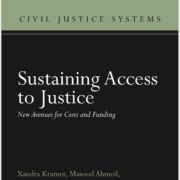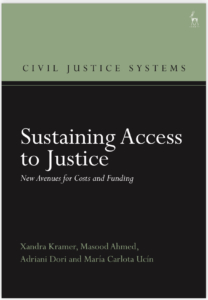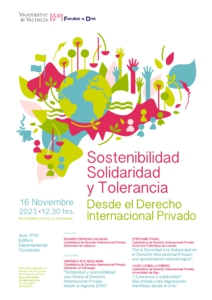This post was written by Begüm Kilimcio?lu (PhD researcher), Thalia Kruger (Professor) and Tine Van Hof (Guest professor and postdoctoral researcher), all of the University of Antwerp.
During the last plenary meeting of the current composition of the European Parliament (before the elections of June 2024), which took place from Monday 22 until Thursday 24 April, several proposals relevant to private international law were put to a vote (see the full agenda of votes and debates). All of the regulations discussed here still have to be formally approved by the Council of the European Union before they become binding law, in accordance with the ordinary legislative procedure.
It is interesting to note that, while many pieces of new legislation have a clear cross-border impact in civil matters, not all of them explicitly address private international law. While readers of this blog are probably used to the discrepancies this has led to in various fields of the law, it is still worth our consideration.
First, the European Parliament voted on and adopted the proposal for a Directive on Corporate Sustainability Due Diligence (CSDDD) with 374 votes in favour, 235 against and 19 abstentions (see also the European Parliament’s Press Release). The text adopted is the result of fierce battles between the Commission, Parliament and the Council and also other stakeholders such as civil society, academics and practitioners. This necessitated compromise and resulted in a watered-down version of the Commission’s initial proposal of 23 February 2022 and does not go as far as envisaged in the European Parliament’s Resolution of 10 March 2021 (see also earlier blog pieces by Jan von Hein, Chris Tomale, Giesela Rühl, Eduardo Álvarez-Armas and Geert van Calster).
The Directive is one of the few instruments worldwide that put legally-binding obligations on multinational enterprises. It lays down obligations for companies regarding their adverse actual and potential human rights and environmental impacts, with respect to their own operation, the operations of their subsidiaries, and the operations carried out by their business partners in the chains of activities. The Directive further stipulates specific measures that companies have to take to prevent, mitigate or bring an end to their actual or potential adverse human rights impacts. Besides national supervisory authorities for the oversight of the implementation of the obligations, the Directive enacts civil liability for victims of corporate harm.
The adopted Directive is more or less silent on private international law. The closest it gets to addressing our field of the law is Article 29(7), placing the duty on Member States to ensure the mandatory nature of civil remedies:
Member States shall ensure that the provisions of national law transposing this Article are of overriding mandatory application in cases where the law applicable to claims to that effect is not the national law of a Member State.
and Recital 90, which is more general:
In order to ensure that victims of human rights and environmental harm can bring an action for damages and claim compensation for damage caused when the company intentionally or negligently failed to comply with the due diligence obligations stemming from this Directive, this Directive should require Member States to ensure that the provisions of national law transposing the civil liability regime provided for in this Directive are of overriding mandatory application in cases where the law applicable to such claims is not the national law of a Member State, as could for instance be the case in accordance with international private law rules when the damage occurs in a third country. This means that the Member States should also ensure that the requirements in respect of which natural or legal persons can bring the claim, the statute of limitations and the disclosure of evidence are of overriding mandatory application. When transposing the civil liability regime provided for in this Directive and choosing the methods to achieve such results, Member States should also be able to take into account all related national rules to the extent they are necessary to ensure the protection of victims and crucial for safeguarding the Member States’ public interests, such as its political, social or economic organisation.
While the text contains references to numerous existing Regulations, Brussels I and Rome I are not among them; not even a precursory or confusing reference as in Recital 147 of the GDRP.
Second, the European Parliament voted on two other proposals that build on and implement the objectives of the European Green Deal and the EU Circular Economy Action Plan. The first is a proposal for a Regulation establishing a framework for setting eco-design requirements for sustainable products with 455 votes in favour, 99 against and 54 abstentions (see also the European Parliament’s Press Release). The Regulation aims to reduce the negative life cycle environmental impacts of products by improving the products’ durability, reusability, upgradability, reparability etc. It sets design requirements for products that will be placed on the market, and establishes a digital product certificate to inform consumers.
This Regulation does not contain a private-international-law type connecting factor for contracts or products. Neither does it expressly elevate its provisions to overriding rules of mandatory law (to at least give us some private international law clue). Its scope is determined by the EU’s internal market. All products that enter the European market have to be in conformity with the requirements of both regulations, also those that are produced in third countries and subsequently imported on the European market (Art. 3(1)). “Products that enter the market” is the connecting factor, or the basis for applying the Regulation as overriding mandatory law. The Regulation is silent on products that exit the market. Hopefully the result will not be that products that were still in the production cycle at the time of entry into force will simply be exported out of the EU.
The third adopted proposal is the Regulation on packaging and packaging waste with 476 votes in favour, 129 against and 24 abstentions (see also the European Parliament’s Press Release). This Regulation aims to reduce the amount of packaging placed on the Union market, ensuring the environmental sustainability of the packaging that is placed on the market, preventing the generation of packaging waste, and the collection and treatment of packaging waste that has been generated. To reach these aims, the regulation’s key measures include phasing out certain single-use plastics by 2030, minimizing so called “forever chemicals” chemicals in food packaging, promoting reuse and refill options, and implementing separate collection and recycling systems for beverage containers by 2029.
Like the Eco-design Regulation, no word on Private International Law, no references. The Regulation refers to packaging “placed on the market” in various provisions (most notably Art. 4(1)) and recitals (e.g. Recitals 10 and 14).
Lastly, the European Parliament approved the proposal for a regulation on prohibiting products made with forced labour on the Union market with an overwhelming majority of 555 votes in favour, 6 against and 45 abstentions (see also the European Parliament’s Press Release). The purpose of this Regulation is to improve the functioning of the internal market while also contributing to the fight against forced labour (including forced child labour). Economic operators are to eliminate forced labour from their operations through the pre-existing due diligence obligations under Union law. It introduces responsible authorities and a database of forced labour risk areas or products.
Just as is the case for the other Regulations, this Regulation does not contain references to private international law instruments, and no explicit reference to instruments in this field, even though the implementation of the Regulation requires vigilance throughout the value chain. It would be correct to assume that this provides overriding mandatory law, as the ban on forced labour is generally accepted to be jus cogens even though the extent of this ban is contentious (see Franklin).
Other proposals that are more clearly in the domain of private international law have not (yet?) reached the finish line. First, in the procedure on the dual proposals in the field of the protection of adults of 31 May 2023, the European Parliament could either adopt them or introduce amendments at first reading. However, these proposals have not reached the plenary level before the end of term and it will thus be for the Conference of Presidents to decide at the beginning of the new parliamentary term whether the consideration of this ‘unfinished business’ can be resumed or continued (Art. 240 Rules of Procedure of the European Parliament).
In the second file, the proposal for a Regulation in matters of parenthood and on the creation of a European Certificate of Parenthood of 7 December 2022 the European Parliament was already consulted and submitted its opinion in a Resolution of 14 December 2023. It is now up to the Council of the European Union to decide unanimously (according to the procedure in Art. 81(3) of the Treaty on the Functioning of the European Union). It can either adopt the amended proposal or amend the proposal once again. In the latter case the Council has to notify or consult (in case of substantial amendments) the European Parliament again.



 We are please to announce that registration for the next bi-annual conference of the
We are please to announce that registration for the next bi-annual conference of the  On 16 November 2023, on the “International Day of Tolerance”, Prof. Rosario Espinosa Calabuig, is organising a new International Seminar, this time under the title: SUSTAINABILITY, SOLIDARITY AND TOLERANCE FROM PRIVATE INTERNATIONAL LAW.
On 16 November 2023, on the “International Day of Tolerance”, Prof. Rosario Espinosa Calabuig, is organising a new International Seminar, this time under the title: SUSTAINABILITY, SOLIDARITY AND TOLERANCE FROM PRIVATE INTERNATIONAL LAW.